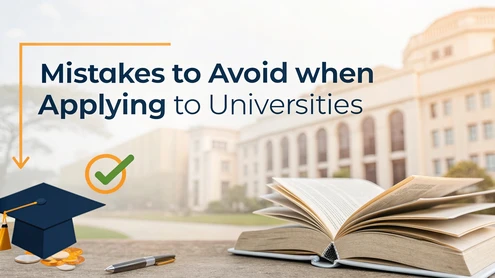Applying to universities is one of the most important steps in shaping your academic and professional future. With the pressure to choose the right course, meet deadlines, and impress admissions committees, it’s easy to make mistakes that can cost you your place at your dream institution. In this guide, we’ll go over the most common mistakes students make when applying to universities and how to avoid them.
1. Missing Application Deadlines
One of the biggest—and most common—mistakes is missing the application deadline. Universities are strict about deadlines, and late applications are often not considered.
How to avoid it:
-
Create a calendar or checklist with all your university application deadlines.
-
Set reminders a few weeks in advance so you’re never caught off guard.
-
Start your applications early, especially if documents like reference letters or transcripts are required.
2. Applying Without Research
Some students apply to universities simply because they’ve heard of them or because their friends are applying there. This approach can lead to poor decisions and lower chances of acceptance.
How to avoid it:
-
Research each university’s programs, location, reputation, tuition fees, student support, and entry requirements.
-
Consider whether the university fits your academic and personal goals.
-
Visit campus (if possible), attend virtual tours, or talk to current students and alumni.
3. Not Meeting the Minimum Requirements
Every university and course has specific admission requirements—whether it's minimum grades, prerequisite subjects, or language proficiency. Applying without meeting these requirements is a waste of time and effort.
How to avoid it:
-
Read the entry requirements for each course carefully.
-
Be honest with yourself about your academic performance.
-
Apply to a mix of "dream," "match," and "safe" schools to increase your chances of acceptance.
4. Overlooking Application Fees
Some universities require a non-refundable application fee. If you don’t pay it, your application won’t be processed. Forgetting to pay or assuming it's free can result in your application being disregarded.
How to avoid it:
-
Check the application fee policy on each university’s website.
-
Budget for these fees ahead of time.
-
Look for universities that offer free applications or fee waivers if you're unable to pay.
5. Failing to Prepare Supporting Documents
Documents like academic transcripts, ID copies, proof of residence, letters of recommendation, and English proficiency test scores are often required. Submitting incomplete or incorrect documents can delay or cancel your application.
How to avoid it:
-
Make a checklist of required documents for each application.
-
Ensure all documents are clear, certified, and submitted in the correct format.
-
Double-check spelling of your name and your ID number on every document.
6. Neglecting Financial Planning
Many students apply without considering whether they can afford the tuition fees, accommodation, books, and living expenses. This can lead to financial stress or dropping out mid-course.
How to avoid it:
-
Review the full cost of attending each university.
-
Explore funding options like bursaries, scholarships, student loans, or part-time work opportunities.
-
Talk to your family or a financial advisor to plan accordingly.
7. Using the Wrong Email Address or Contact Info
Your email address is how universities communicate with you. Using an email you don’t check, or one that sounds unprofessional, could cause you to miss important updates.
How to avoid it:
-
Use a professional-looking email address (e.g., name.surname@gmail.com).
-
Check your inbox (and spam folder) regularly for updates.
-
Ensure your phone number and address are accurate.
8. Applying to Too Few or Too Many Universities
Applying to just one or two universities limits your chances. On the other hand, applying to too many without proper research spreads your time and energy thin.
How to avoid it:
-
Aim to apply to 4–8 universities that suit your qualifications and interests.
-
Categorize them into reach, match, and safety schools.
-
Focus on quality over quantity in your applications.
9. Ignoring Alternative Admission Routes
Many students overlook alternative paths like foundation programs, bridging courses, or TVET colleges that can lead to a university qualification later.
How to avoid it:
-
Ask each university if they offer alternative admission options.
-
Look into programs that accept lower marks but allow progression into a degree.
-
Use gap years productively by upgrading your results or gaining experience.
10. Leaving Applications to the Last Minute
Rushing your application can lead to errors, missed documents, and sloppy writing. Admissions officers can spot rushed applications easily—and they don’t leave a good impression.
How to avoid it:
-
Set personal deadlines a few weeks ahead of the official ones.
-
Give yourself time for review, editing, and unexpected delays.
-
Ask teachers or mentors for feedback before submitting.
11. Not Following Instructions Carefully
Each university has different formats, portals, and document requirements. Uploading the wrong document or missing a section can make your application incomplete.
How to avoid it:
-
Read all application instructions carefully—twice if needed.
-
Follow file format and naming guidelines.
-
Ensure every field is filled out properly before clicking submit.
Final Thoughts
The university application process may seem overwhelming, but avoiding these common mistakes can make it a lot smoother and increase your chances of success. Start early, stay organized, and don’t hesitate to ask for help when you need it. Remember, applying to university isn’t just about meeting deadlines—it’s about making informed decisions that shape your future.



